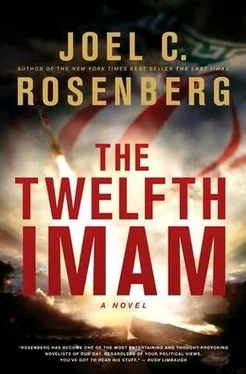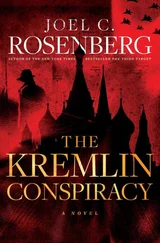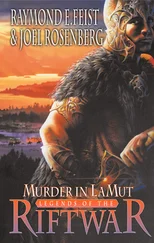“I understand, sir. But believe me, we can take care of this for you, and we want to. We’ll get you the best price and the best people. You have my word.”
“That is good enough for me,” Rashidi said.
Esfahani nodded his agreement. “Now we have another request.”
Hamadan, Iran
Najjar got home late and exhausted.
The apartment was dark and quiet. On the kitchen table was a note that read, I’m at my parents’ for dinner. Will be home late. Don’t wait up. But have you heard the rumors? Someone has seen him. They say he’s coming soon. Isn’t this exciting? Love and kisses, Sheyda.
Najjar was furious. He was tempted to jump back in the car, drive over to his in-laws’, and have it out with his father-in-law right there and then. Of course he had heard the news. Dr. Saddaji had told his entire staff about Ayatollah Hosseini’s vision of the Twelfth Imam, and the news had exhilarated Najjar. He had been waiting for the Mahdi for most of his life. Finally there would be justice. Finally there would be peace. But he was increasingly convinced that his father-in-law believed a nuclear war against the U.S. and Israel had to precede the Mahdi’s arrival. Najjar resisted this notion with every fiber of his being. Yes, he had vowed to serve Allah with all that he was. Yes, he had vowed to devote himself to preparing for the coming of the Twelfth Imam. But he couldn’t be party to genocide. That couldn’t possibly be what the Mahdi really wanted for him and his family.
Yet it was becoming clear to Najjar that this was precisely what his father-in-law believed, that mankind in general-and the Iranian government in particular-was responsible for proactively and intentionally unleashing the “blood and fire” that would be the last sign before the Twelfth Imam’s arrival on earth. That was why he was secretly building the Islamic Bomb. Did Dr. Saddaji’s wife, Farah, know this? Did Sheyda? Did they know their husband and father was a cold-blooded murderer? Najjar couldn’t believe they did. And how could he tell them? What would they do if they learned the truth? Moreover, what should he do? Resign in protest? Move to another city? Move to another country?
To Najjar, overseeing Iran’s version of the Manhattan Project and lying to the world about it every day was morally repugnant. But to order a man killed-beheaded, no less-without the benefit of a trial or a judge, and to do so in the presence of other senior physicists working under his direction? This was beyond the pale. Yet this was the life his father-in-law was living, and the message to Najjar, to his team, and ultimately to his family as well was clear: Betray me, and you’re an infidel. Become an infidel, and you are dead.
The truth was slowly coming into focus for Najjar, but as it did, it became clear that he could not say anything to his wife. Or to his mother-in-law. Or to anyone else. He couldn’t move his family. He couldn’t take them out of the country. He was trapped in a family led by a man without conscience, a man who would commit any atrocity in the name of jihad.
Najjar collapsed in a chair in the living room and picked up the television remote. He desperately needed to escape, if only in his mind.
Satellite dishes were illegal in Iran, which was why everyone had one. Sheyda was actually the one who had begged Najjar to get one, so long as he promised not to tell her parents. Najjar, eager for news of the outside world, had happily agreed. They had saved for nearly a year to afford a good system, but a friend had installed it for them just the previous weekend.
Najjar turned on the TV and began searching through the hundreds of channels now available to him. He immediately skipped past any program produced by the government and past sporting events, of which he’d never been a big fan. Coming across the BBC, he paused for a moment to watch a breaking news story about two Israeli Dolphin-class submarines-each likely equipped with ballistic missiles capped with nuclear warheads-passing through the Suez Canal. A British intelligence analyst speculated the subs were most likely headed for the Indian Ocean or the Persian Gulf, presumably to park off the coast of Iran and await orders from Jerusalem.
Further depressed by such a prospect, Najjar kept scanning. Suddenly he came across a network he had never heard of before and a character he had never seen. On screen was an elderly priest of some kind, wearing a black cassock, a black cap, and a large metal cross. But it was not the man’s looks that forced Najjar to stop and watch for a moment. It was what the man was saying.
“Children are brainwashed that Islam is the truth,” the priest declared, looking directly into the camera. “Children are brainwashed that Muhammad is the last prophet, that the Christians are infidels, and that the Jews are infidels. They repeat it constantly.”
Afraid of being overheard by his neighbors, Najjar instantly lowered the volume but didn’t turn the channel. He couldn’t look away. He was stunned by the intensity of the man’s voice and the brazenness of his words. This priest was speaking Egyptian Arabic, but Najjar could understand him quite well, given his own upbringing in Iraq.
“Islam, as portrayed in the Qur’an, in the Hadith, and in The Encyclopedia of Islam , was spread by means of the sword,” the priest explained. “The sword played a major role in spreading Islam in the past, and it is the sword that preserves Islam today. Islam relies upon jihad in spreading the religion. This is very clear in the encyclopedia. This appears in section 11, page 3,245. It says, ‘Spreading Islam by means of the sword is a duty incumbent upon all Muslims.’ Thus, Islam is spread by means of the sword.”
Now the priest leaned forward and spoke with great passion. “It’s time for the church to stand up with courage and conviction and say in the power of the Holy Spirit, ‘Islam is not the answer; jihad is not the way. Jesus is the way. Jesus is the truth. Jesus is the life. And no man or woman can come to the Father except through faith in Jesus Christ.’ This is the message of John 14:6. This is the message of the entire New Testament. And this message of faith is filled with love, not with swords.”
It was as if electricity were coursing through Najjar’s system. He was no longer slumped in his chair. He was sitting up straight, at once furious at this man, wanting to throw his shoe at the television, yet simultaneously intrigued beyond anything he could imagine. How could the government allow such things to be on television? Wasn’t anyone trying to stop this man? Mesmerized, Najjar kept watching.
“Now is not the time to hide in fear from the Muslim world,” the priest declared. “Now is the time to take the gospel of Jesus Christ to every man, woman, and child on the planet and proclaim Him as the hope of mankind, the only hope for the troubled world. I have been doing this for most of my life, sharing the good news of salvation through Jesus Christ with the people of the Middle East. For this I was exiled from my home country of Egypt. For this I have been named ‘Islam’s public enemy number one.’ For this there is now a price on my head. But I love Jesus more than my life. And because Jesus loves Muslims, because He came and laid down His life to save them, I love them too. And I am willing to lay my life down if necessary to reach them for my beloved Jesus.”
Najjar had never heard anyone talk like this.
“The God of the Bible is moving powerfully in the Muslim world today,” the priest continued. “He is drawing Muslims out of Islam to faith in Jesus Christ in record numbers. Yes, there is much bad news in the Muslim world today. But there is also much good news; more Muslims have come to faith in Jesus Christ in the last three decades than in the last fourteen centuries of Islam put together. This is the greatness of our great God.”
Читать дальше












